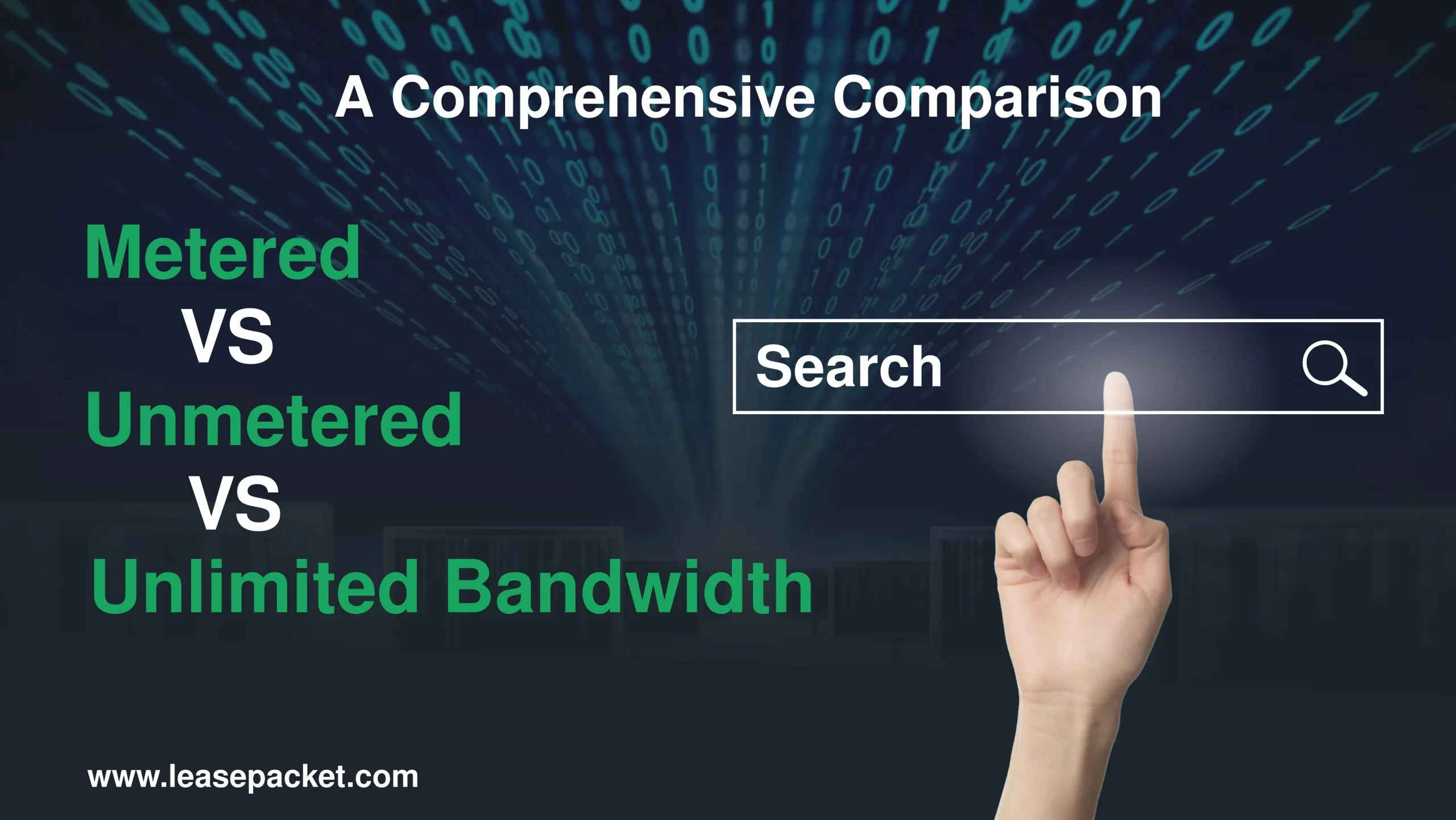Bandwidth is a critical aspect of internet connectivity that affects how quickly data can be transferred between devices or networks. Understanding different types of bandwidth – metered vs. unmetered vs. unlimited bandwidth – is essential for individuals and businesses to make informed decisions about their internet usage and service subscriptions. We’ll be comparing metered, unmetered and unlimited bandwidths in this blog. Let’s get started.
Table of Contents
What is Bandwidth?
Bandwidth is the maximum data transfer rate across a network or internet connection. It determines how fast information can be transmitted from one point to another. Bandwidth is calculated in the following – bits per second (bps), kilobits per second (kbps), megabits per second (Mbps), or gigabits per second (Gbps). Bandwidth is the capacity of a network connection to transmit data. It is often compared to the width of a pipe – the wider the pipe, the more data can flow through it at once.
Importance of Bandwidth in Internet Services
Bandwidth plays a crucial role in determining the speed and performance of internet services. Higher bandwidth allows faster downloads, smoother streaming of multimedia content, and quicker access to web pages.
Metered vs. Unmetered vs. Unlimited Bandwidth Explained
Metered Bandwidth
Metered bandwidth involves a pricing model where users are charged based on the amount of data they transfer over a specified period. It is common in mobile data plans and some internet service provider (ISP) packages.
Pros & Cons of Metered Bandwidth
Metered bandwidth means that users pay for the data they consume, much like paying for utilities such as electricity or water based on usage.
Pros
1. Cost control: Users can monitor their data usage and adjust their internet activities to stay within budget.
2. Flexibility: Metered plans may offer different pricing tiers to accommodate varying usage needs.
Cons
1. Overage charges: Exceeding the allotted data limit can cost additional fees, leading to unexpected expenses.
2. Usage limitations: Users may feel constrained in their internet usage, particularly for activities that consume a lot of data, such as streaming high-definition video or downloading large files.
Common Applications of Metered Bandwidth
1. Mobile data plans: Many cellular providers offer metered data plans where users pay for the amount of data they consume.
2. Satellite Internet: Some satellite internet services operate on a metered bandwidth model due to the limited capacity of satellite communication.
Unmetered Bandwidth
Unmetered bandwidth provides users unlimited data usage within a specified period, typically without additional charges based on usage volume. It is commonly used in certain hosting services and dedicated server packages.
Pros & Cons of Unmetered Bandwidth
Unmetered bandwidth allows users to transfer data without worrying about exceeding data caps or incurring overage fees. Instead of paying based on usage, users pay a flat rate for unlimited data access.
Pros
1. Predictable costs: Users can budget more effectively since they know the amount they will pay for internet access.
2. Freedom of usage: With unmetered plans comes the flexibility to use the internet as much as you want without fear of additional charges.
Cons
1. Potential for congestion: In shared hosting environments, unmetered bandwidth may lead to network congestion if multiple users consume excessive amounts of data simultaneously.
2. Higher initial cost: Unmetered plans may be more expensive upfront than metered plans – as users are paying for unlimited access.
Common Applications of Unmetered Bandwidth
1. Web hosting: Many web hosting providers offer unmetered bandwidth plans for hosting websites and online applications.
2. Dedicated servers: Unmetered bandwidth is often included in dedicated server hosting packages, providing users with dedicated resources for their internet usage.
Unlimited Bandwidth
Unlimited bandwidth is similar to unmetered bandwidth – it offers users unrestricted data usage without caps or additional charges. It is prevalent in residential internet plans and premium hosting services.
Pros & Cons of Unlimited Bandwidth
Unlimited bandwidth plans promise users limitless data usage without restrictions or penalties for exceeding usage thresholds. However, there may be fair usage policies in place to prevent abuse.
Pros
1. No usage constraints: Users can utilize the internet without worrying about data limits or overage charges, allowing uninterrupted streaming, downloading, and browsing.
2. Convenience: Unlimited plans eliminate the need for monitoring data usage or adjusting internet activities to avoid exceeding caps.
Cons
1. Potential for throttling: Some unlimited plans may throttle internet speeds during network congestion or for users who exceed certain usage thresholds.
2. Fair usage policies: Providers may enforce fair usage policies to prevent abuse of unlimited plans, which could result in slower speeds for heavy users.
Common Applications of Unlimited Bandwidth
1. Residential internet: Many home internet service providers offer unlimited bandwidth plans to households for streaming, gaming, and other online activities.
2. Premium hosting services: High-end hosting providers may offer unlimited bandwidth options for websites & applications with high traffic volumes.
Metered vs. Unmetered vs. Unlimited Bandwidth Comparison
Metered vs. Unmetered vs. Unlimited Bandwidth Plans
| Metered | Unmetered | Unlimited | |
| Data limit | Yes | No | No (may have hidden usage caveats or restrictions) |
| Overage charges | Yes | No | No |
| Speed throttling | Yes | Yes | Yes |
| Usage | Light | Heavy | Heavy |
| Monthly cost | Affordable | Moderate | Higher |
Comparison of Bandwidth Types
When choosing between metered vs. unmetered vs. unlimited bandwidth options – several factors should be considered to determine the most suitable choice for individual or business needs.
1. Cost Considerations
Metered bandwidth
Users pay for the amount of data they consume, which can result in variable monthly costs depending on usage.
Unmetered bandwidth
Users pay a flat rate for unlimited data access, providing predictable monthly expenses.
Unlimited bandwidth
Same as unmetered bandwidth, unlimited plans offer predictable costs without usage constraints – although they may be subject to fair usage policies.
2. Performance Metrics
Metered bandwidth
Performance may vary based on data usage and network congestion, particularly if users exceed their allotted data limits.
Unmetered bandwidth
Users enjoy consistent performance regardless of data usage, although network congestion may still occur in shared environments.
Unlimited bandwidth
Performance remains consistent with no restrictions on data usage – but providers may implement throttling during peak times or for heavy users.
3. Flexibility & Scalability
Metered bandwidth
Provides flexibility to adjust internet usage based on budget constraints or changing needs, but users must monitor data usage to avoid overage charges.
Unmetered bandwidth
Offers unlimited usage with fixed monthly costs, providing convenience & scalability for growing internet needs.
Unlimited bandwidth
Provides unlimited data usage without caps or restrictions, ideal for users with high bandwidth requirements and predictable monthly expenses.
4. Suitable Use Cases for Each Bandwidth Type
Metered bandwidth
Suitable for users who have predictable data usage patterns and want to control costs by paying for only what they use.
Unmetered bandwidth
Ideal for users who require constant internet access without worrying about data limits or overage fees, such as businesses with steady traffic volumes.
Unlimited bandwidth
Best suited for users with high bandwidth requirements and heavy internet usage, offering unrestricted access without concerns about data caps or throttling.
Metered vs. Unmetered vs. Unlimited Bandwidth Statistics
Metered Bandwidth
Around 57% of businesses prefer metered bandwidth plans to manage costs effectively, according to a survey by Flexera.
Unmetered Bandwidth
Unmetered bandwidth usage has surged by 68% among households during the pandemic, according to a report by Sandvine’s Global Internet Phenomena Report.
Unlimited Bandwidth
Over 80% of mobile subscribers in the United States opt for unlimited data plans, marking a significant shift in consumer preferences, according to CTIA’s Wireless Industry Survey.
Conclusion
By understanding the nuances of bandwidth types – metered vs. unmetered vs. unlimited bandwidth – one can make informed decisions and implement best practices for bandwidth provisioning and management. Whether it’s about monitoring bandwidth usage or adapting to regulatory requirements – bandwidth management enables businesses to drive digital transformation.
FAQs
Q1. What is metered bandwidth?
Metered bandwidth is a billing model where users pay for the data transferred over a network within a specific period.
Q2. State one pro and one con of metered bandwidth?
Cost-effective for low-usage scenarios, predictable billing based on actual usage.
Potential for unexpected overage charges during high-traffic periods – limited scalability for businesses with fluctuating bandwidth needs.
Q3. What is unmetered bandwidth?
Unmetered bandwidth is a billing model where users pay a fixed fee for unlimited data transfer without usage-based charges.
Q4. State one pro and one con of unmetered bandwidth?
Predictable billing with no overage charges, ideal for high-traffic websites or applications.
Higher upfront costs than metered bandwidth, the potential for underutilization in low-traffic scenarios.
Q5. What is unlimited bandwidth?
Unlimited bandwidth is a billing model where users pay a fixed fee for unrestricted access to bandwidth resources without usage caps or throttling.
Q6. State one pro and one con of unlimited bandwidth?
No limitations on data transfer, suitable for businesses with high and unpredictable bandwidth demands.
Higher upfront costs than metered or unmetered bandwidth, the potential for network congestion, and performance issues during peak usage times.

























